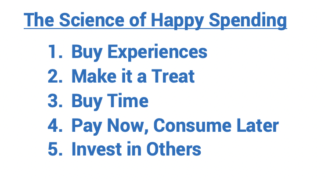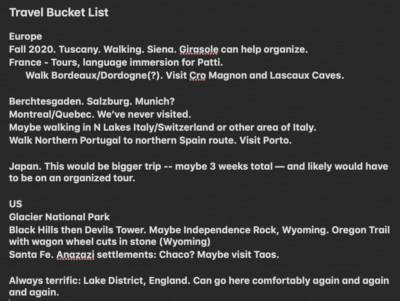What experiences will you buy in 2020?
Posted on January 24, 2020

I read this book and liked it: Happy Money: The Science of Happier Spending. The book says we – especially retirees — should think about money differently. The science of happiness tells us we should not view our money as a means to get more money – that’s what we typically do – but we should view money as a means to get more happiness. The book lists five key principles as to how should use money to make us happier: 1) Buy Experiences; 2) Make it a Treat; 3) Buy Time; 4) Pay Now, Consume Later; and 5) Invest in others. This post discusses how Patti and I think about Buying Experiences and weaves in aspects of the next three principles. What experiences do you plan to buy and how will you buy them in 2020?
== Our BIG experiences: Travel ==
Travel by far is the largest discretionary expense for Patti and me. Our vacations are the most memorable experiences we buy. We are in good health now and want to continue to buy travel experiences. Happy Money says we get far more happiness when we spend on experiences than when we spend to buy stuff. I’d agree. My desire for stuff has crashed. I have close to zero urge to spend on a new car, for example. I bought two pair of travel pants about 18 months ago. They’re great. They wear like iron. I think that’s about it for pants purchases for a few more years.
Do you have travel plans for 2020? Most friends tell me they do, and I think that’s great. Some of my friends that I think have a nice nest egg and are clearly in good health tell me they don’t like to travel. I wonder how they’re going to enjoy the money they have.
== We think differently: our monthly pay ==
I think Patti and I have an advantage in how we view our money. We calculate our annual Safe Spending Amount (SSA) and pay it out monthly to ourselves. We get a steady paycheck just like when we worked – when we were in the Save and Invest phase of life – but now we know we have no real reason to save one dime of it. It’s a lot easier for us to think how to use money to increase our happiness.
I think most retirees fail to pay themselves from their nest egg and therefore they think differently about their money. If I didn’t send that monthly check to ourselves, I think every time we’d think about spending a big amount for travel, I’d be calculating how much that was going to cost in future growth in our portfolio. I’d probably ask, “Can’t we find something that costs less?” I’d be stuck in the Save and Invest phase of life. That’s not the right way to think about money as set forth in the book.
== Anticipation is happiness ==
One of the principles of happiness is that we get present pleasure by anticipating a future experience. New or novel experiences are best. Experiences you can envision more concretely in the future are better. More distant events are better. Experiences that are physically challenging are more rewarding and memorable.
Patti and I have a travel bucket list that helps think about and anticipate the future. Maybe you do, too. We change it often. The travel we now have planned for fall 2020 wasn’t even on the list last fall. We’re streaming Ken Burn’s West documentary, and I just added two possible travel experiences to the list. We discuss the trips we might want to take, re-rank them, and decide which ones we will buy in the upcoming year or years. We keep the list as a Note on our iPhones/computers that we each can amend. Here’s our current list.

We like travel to be active and connected to the outdoors. Patti and I like to walk/hike on our vacations and hope we can continue to be active for a number of years. But we’re past the age of looking for physical challenges to make our experiences more memorable. We know we will be pleasantly tired at the end of eight miles and that’s just fine. I do like that I have to prepare weeks ahead of a trip to make sure I can hike eight miles and just be pleasantly tired and not ache the next day. That routine reinforces anticipation.
We like to always have our vacations fully planned – and largely paid for – at least six months in the future. I’ve always liked knowing we have something to look forward to. Our 2020 experience that is furthest in the future is at the end of September and early October: two weeks in Tuscany. We’ve never been to that part of Italy. This will be a treat for us.
I generally like to plan the complete details of our walking vacations in advance. I don’t like to conform to a set agenda. I don’t dig in to get a good picture of where we will be and what we will be doing if I totally delegate that to the tour company.
Organizing the days has always been very easy to do for our travels to England. The information on the long-distance walking trails is terrific. Train, bus or taxi is very easy to organize ahead of time. I used to spend hours figuring out miles per day and where we would stay. It’s a lot easier for the recent past since we’ve been to the Lake District for or five times now.
I want a self-guided walking. When we’re going to a non-English speaking country I don’t try to organize the details myself. I want a local company to help: they’ve laid out the walks; they arrange all the logistics of getting where we are staying to the start of each day’s walk; they know the best places to stay; they usually have three levels of quality and cost of accommodation to pick from. Here are three companies that we have used in Portugal, Italy, and France.
== Pay Now, Consume later. ==
I like having to pay for the package before the trip. We spend most on travel in January or February. Patti will work her magic and buy most, if not all, airfares, and I’ll make the deposits for all our trips for the year. Once we’re past that first-of-year hump, it’s all downhill. We spend very little when we are on the trip. I like getting back and seeing that we’ve very charged very little to our credit card.
I like the fact that logistics expenses are bundled in the tour packages. I don’t want to think about that detail. The self-guided packages we buy are roughly half the price per day of higher-end guided walking tours. We wind up asking for changes to the suggested daily details. A standard package may be seven days and six nights. We typically want to stay two weeks. We wind up asking the tour companies to help us stretch our stay to more nights and maybe more walks. We’ve stretched the standard seven-day/seven-night package to 12 nights in Tuscany this fall, for example.
I’m not inclined to dig into the details of the costs we might be adding to the standard package. Luciano (Girasole) was great in telling us he wanted to arrange for a driver to take us from the Rome airport to Siena. Going first to Rome and then Siena would have been a logistical nightmare. Hiring a driver means we’re using money to buy time and avoid stress. That cost is buried in the total price. I don’t have to think about how much I’m paying for the driver, nice car, and two-hour drive.
Conclusion: We all typically spend hours and hours and willingly pay for advice to understand how best to save and invest. We trust our intuition as to the best ways to spend to make us happy, and science tells us our intuition is often wrong. Follow five principles for happier spending: 1) Buy Experiences; 2) Make it a Treat; 3) Buy Time; 4) Pay Now, Consume Later; and 5) Invest in Others.